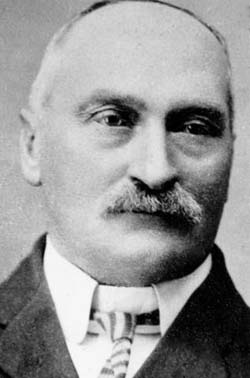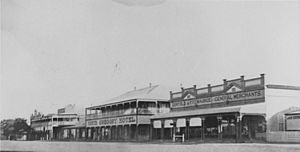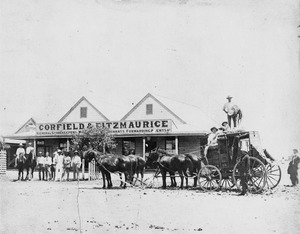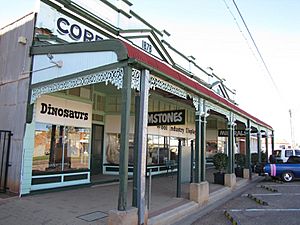- This page was last modified on 17 October 2025, at 10:18. Suggest an edit.
Corfield & Fitzmaurice Store facts for kids
| Corfield & Fitzmaurice Store | |
|---|---|
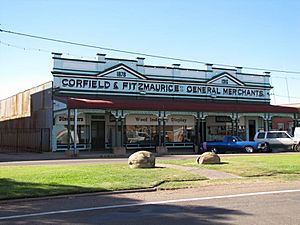
Corfield & Fitzmaurice Store, 2013
|
|
| Location | 63 Elderslie Street, Winton, Shire of Winton, Queensland, Australia |
| Design period | 1914–1919 (World War I) |
| Built | 1916 |
| Official name: Corfield & Fitzmaurice Store | |
| Type | state heritage (built) |
| Designated | 21 October 1992 |
| Reference no. | 600965 |
| Significant period | 1910s (fabric) 1916–1987 (historical use) |
| Significant components | cold room/cold store, shed - storage, furniture/fittings |
| Lua error in Module:Location_map at line 420: attempt to index field 'wikibase' (a nil value). | |
The Corfield & Fitzmaurice Store is a special old building in Winton, Australia. It used to be a big general store where people bought all sorts of things. Today, it's a visitor centre for tourists. The building you see now was built in 1916. It's listed on the Queensland Heritage Register, which means it's an important historical place.
Contents
A Store with a Long History
The Corfield & Fitzmaurice Store has stood on this spot for a very long time. The current building from 1916 is not the first one. Earlier versions of the store helped create the main street of Winton.
How Winton Began
Around 1866, the first cattle farms, called pastoral runs, started in this area. In 1876, a man named Robert Allen opened a small store and hotel. This was at a place called Pelican Water Hole. But this spot often flooded. So, in 1878, a new town site was chosen about a mile away. It was named Winton, after Allen's home in England.
The First Corfield & Fitzmaurice Store
In 1878, William Henry Corfield teamed up with Robert Fitzmaurice. Corfield had been in the transport business, moving goods around. They decided to open a store and a hotel in the new town of Winton. They traveled from Townsville with goods and set up a simple store. It was made of tree branches and a tarpaulin. This first store, along with Allen's relocated building, helped start the main street of Winton.
Corfield then went back to Townsville. He brought back timber and iron to build a new hotel called the North Gregory Hotel. Fitzmaurice also went to Townsville to get his family and more building materials for a stronger store. Both buildings were finished by 1879 and did very well. Winton officially became a town that same year. Its streets, like Elderslie Street where the store is, were named after nearby farms.
Growing Business and Changes
In 1880, Corfield and Fitzmaurice bought the land where their store stood. Winton grew quickly. By 1883, about 300 people lived there. In 1884, Fitzmaurice lost his eyesight. Corfield bought out his share and sold the hotel. He then partnered with W.M. Campbell.
The famous transport company Cobb and Co opened a depot in Winton in 1885. Corfield became their local agent, helping with their business. In 1888, he became a politician, representing the Gregory area in the Queensland Parliament. However, in 1898, his business partner Campbell became ill. Corfield returned to help run the store.
The Corfield and Fitzmaurice store was expanded in 1899. Sadly, this store was destroyed by fire in 1916. The building you see today was built right after the fire. After Campbell passed away, Thomas James O'Rourke became Corfield's new partner.
What the Store Sold
The "Corfield and Fitzmaurice" store was a very important general store and warehouse. It supplied the surrounding area with a huge variety of goods. You could order almost anything through them! Orders were sent to Brisbane and came back by train or road.
Inside the store, there were different sections. You could find groceries, household items, and clothing. In sheds behind the store, they kept things like drinks, grain, and farm tools. There was even a special room where traveling salespeople could show off their products. The store became famous in the area. Shopping there was also a fun social event for families who lived far away.
The Store Today
The Corfield and Fitzmaurice Store stopped being a general store in 1987. In 1994, it reopened as the Corfield and Fitzmaurice Winton Tourism Development Centre. Now, it's a place where you can see and buy local crafts. It also has a display that tells the story of the store's long history.
What the Building Looks Like
The old Corfield and Fitzmaurice Store is a large building made of timber. It's shaped like a square. The sides and back of the building are covered with corrugated iron, which is a strong metal sheeting. The roof is also made of corrugated iron and has a unique saw-tooth shape.
There are windows high up on the sides of the building. These let in lots of natural light. The front of the building, facing the street, looks more fancy. It's made of timber and has big display windows. These windows are split into two main parts, with deep entrances in between. On the right side, there's a small office with a wooden door and a narrow window.
A curved awning, also covered in corrugated iron, shades the shop front. It's held up by pairs of wooden posts. A decorative cast iron border runs between the posts. Above the awning, there's a tall metal wall called a parapet. It has two triangle shapes with the dates "1878" and "1916" on them. Below these dates, it says "Corfield and Fitzmaurice Merchants." This whole front design looks very striking!
At the back of the building, there's a cold room. It's also covered in corrugated iron. Inside, the store still looks much like it used to. You can see the old, long wooden counters and wooden shelves built into the walls. There's even a "flying fox" system. This was a special cash railway that moved money and receipts from the counter to a central office raised up high. Today, the store is used to show local crafts, gemstones, and even a dinosaur display.
Behind the main building, there are three rectangular storage sheds. They are also made of corrugated iron and stand on low stumps.
Why This Place is Important
The Corfield & Fitzmaurice Store is listed on the Queensland Heritage Register because it's very important to Queensland's history.
- Shows how Winton grew: This store has been on the same spot since the 1800s. It helps us understand how Winton developed into a busy town for the Western Plains area.
- A rare look inside: The store's inside is still mostly original. It has many old fittings like shelves, display cases, and counters. These show how a traditional store was set up. The "flying fox" cash system is a very rare example of old money-handling technology.
- A great example of an old store: It's a well-preserved example of the kind of general store and warehouse that was vital for country areas. These stores provided all kinds of goods and services.
- Looks beautiful: The elegant and well-kept front of the Corfield and Fitzmaurice store is a landmark in Winton. It adds a lot to the look of the main street.
- Connected to important people: The building is strongly linked to its first owners, William Henry Corfield and Robert Fitzmaurice. They played a big part in starting the town of Winton.

